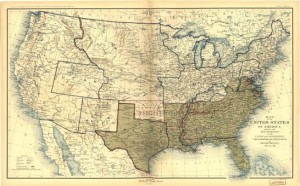 The Civil War is a diaspora for many Southern families, including the Philip Hugh and Frances (Fanny) Wallace family of Paducah, Kentucky. Prior to the war, Philip was an attorney and life for the family was one of ease and luxury and, like many wealthy families of the South, financed (whether directly, indirectly or both) by black slave labor.
The Civil War is a diaspora for many Southern families, including the Philip Hugh and Frances (Fanny) Wallace family of Paducah, Kentucky. Prior to the war, Philip was an attorney and life for the family was one of ease and luxury and, like many wealthy families of the South, financed (whether directly, indirectly or both) by black slave labor.
A diary written by Frances records the family’s involvement in Baptist life.
When the war came in 1861, soon after the birth of the couple’s one child, George Clayton Wallace, Philip joined Confederate General Bragg’s division. Commissioned a captain, he served throughout the remainder of the war. Three years later, Frances and a cousin, Amanda (Mally) Woolfolk, determine to visit their husbands.
Today they board a steamship, Frances taking her son George with her. She writes:
“Is it possible we have at last ‘at least’ started on our long expected trip to “Dixie Land?” I can scarcely realize it is so. Mally and I have been persevering through many difficulties to gain our end, and have faced oppositions and gained our point. All of our friends urged us not to attempt such a hazardous trip, thought it impossible to pass the lines.
We first purchased a wagon and mules and fitted out for a trip through Tennessee, going to Florence, by boat, thence to Dalton, by land; but Mally could not go that way so we gave it up. Many and sore were our disappointments, but we persevered and here we are, and I hope soon to be rewarded for our trouble in the great pleasure of being with our husbands.
Here on the boat we meet Mrs. General Bowen. She is going South also; very pleasant to meet with her. Captain a Union man.
“Dixie Land” is a phrase designating the Deep South, the part of the South in which black slavery is most firmly entrenched.
Frances’ journey in the months ahead takes her and Amanda to Baptist congregations in both Tennessee and Alabama, prior to their return to Kentucky. Like many other Southern women, Frances, when in her diary speaking of slaves, refers to them as “servants.”
Meanwhile, far to the west Californians, the majority decidedly abolitionist in nature, make no pretensions as to the nature of black slavery, as an article in today’s California Pacific Appeal on “Colored Americans and the Government” attests.
The National Government, recently, by its acts and policy, has shown to the enlightened world that it actually means to do justice to a class of subjects whose rights, as such, have hitherto been denied by an obstropulous and baleful minority once wielding its power, and which is now insidiously uttering treason in the loyal States and engaged in serving the rebellion of the slave oligarchy. Every colored American may, in future, get a citizen’s passport, and go to foreign countries, bearing the legal sign as well as the natural front of a man, and be recognized and treated as an American citizen. Of this all should be proud. How great the contrast between the present Administration and that of the one when Geo. M. Dallas was Minister to England. When Mrs. , a colored lady, was denied recognition by the American Minister, and could not be passed to France in consequence of being colored.” No nation was ever more debased than this was, then, by the slavepower. The above-mentioned circumstance was long a subject of derision in Europe, because it was unprecedented in the intercourse of nations. No great nation ever existed that did not make it one of its most sacred duties to intervene for the protection the most humble of its subjects. This gave the sting to our reproach. But happily things have changed. The National Government having set the example of justice and right, there is every prospect that the respective States will gradually follow, by removing the disabilities existing against a class of their citizens, long fastened upon them by force of circumstances, and when they were governed or influenced by the same relentless and rebellious slave-power now in its death struggle with Union and Liberty. Our own State, California, has been reasonably progressive, during the two last sessions of the Legislature, in expunging the slavecode testimony statute and allowing collored children schools. The friends of freedom should rejoice in this gradual progress.
Also in today’s Pacific Appeal is a notice of an upcoming lecture at San Francisco’s Baptist church, a lecture which appears to also address the issue of freedom for humanity.
The Lecture by Dr. W. H. Irwin. —On Tuesday next, Dr. Irwin will deliver the lecture which was to be in the course of those delivered by several gentlemen, just before the holidays, as the Doctor gave way for a lady to take his place at that time. He has been very generous in holding himself in readiness to aid the cause which we are all engaged in, namely, our common elevation. And as he has come forward to give the lecture —all should greet him with a full at the Baptist Church, Dupont street; next Tuesday evening. His subject is: “We Wrestle not against Flesh and Blood, but against Principalities and Powers.” The Lecture will commence at 8 o’clock.
Sources: Diary of Frances Woolfolk Wallace, March 19, 1864, from Documenting the American South by the University of North Carolina at Chapel Hill (link); “Philip H. Wallace” in The History of Kentucky, Edition One, F. A. Battey, 1885, excerpted online at “My Genealogy Hound” (link); “Colored Americans and the Government” and “The Lecture by Dr. W. H. Irwin,” Pacific Appeal, March 19, 1864 (link)


